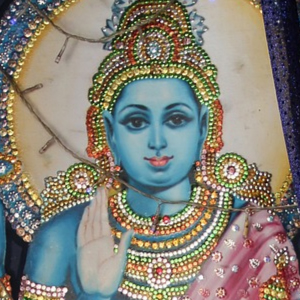- Stillwater Public Schools
- Cultural Observances, Holidays & Events
Krishna Janmashtami
 As the location of a major research university, Stillwater brings families from around the world. India, a largely Hindu country with more than 415 students at Oklahoma State University in 2022, is the largest source of international students in our community and the country of origin or ancestry for many permanent community members. Hindu festivals and holidays are celebrated by many of our students.
As the location of a major research university, Stillwater brings families from around the world. India, a largely Hindu country with more than 415 students at Oklahoma State University in 2022, is the largest source of international students in our community and the country of origin or ancestry for many permanent community members. Hindu festivals and holidays are celebrated by many of our students.
This year, the major Hindu celebration, Krishna Janmashtami, falls on September 6.
This holiday, also known as Janmashtami or Gokulashtami, is a Hindu festival celebrated to mark the birth of Krishna, one of the most revered deities in Hinduism. This holiday typically falls on the eighth day (Ashtami) of the Krishna Paksha (dark fortnight) in the Hindu month of Bhadrapada, which usually occurs in August or September. The festival is observed with great enthusiasm and devotion across India and by Hindu communities around the world, with nearly one billion people worldwide, and around two million in the US celebrating.
Key aspects and customs associated with Janmashtami:
-
Birth of a Divine Figure: Krishna Janmashtami celebrates the birth of Krishna, a revered divine figure in Hinduism. Similarly, various cultures and religions around the world have their own festivals and celebrations that mark the birth of significant spiritual or divine figures who bring hope, wisdom, and guidance to their followers.
-
Midnight Celebration: During Janmashtami, a highlight is the midnight celebration, symbolizing the moment when the divine enters the world, bringing blessings and inspiration to those who celebrate.
-
Fasting and Reflection: Fasting and prayer are common elements during Janmashtami, as devotees use this time for reflection, devotion, and connecting with the divine. People fast the whole day and at midnight, they celebrate the birth of Krishna by breaking their fast.
-
Symbolic Decorations: Temples and homes are adorned with colorful decorations during Janmashtami. This act of decoration is a way of expressing devotion and creating a festive atmosphere.
-
Feasting and Sharing: After the midnight celebrations, people often share meals with loved ones during Krishna Janmashtami. This practice of communal feasting and sharing is a common thread in many cultural celebrations worldwide, symbolizing unity, togetherness, and the sharing of blessings.
In a broad sense, Krishna Janmashtami can be seen as a celebration of universal themes that transcend religious boundaries—birth, the arrival of the divine, self-reflection, communal celebration, and the promotion of values that promote harmony and goodness in society. These shared human experiences and values can help people from diverse backgrounds find common ground and understanding.
To those who celebrate it, Happy Krishna Janmashtami!
Learn more about Janmashtami at https://www.britannica.com/topic/Janmashtami or talk about it with a friend who celebrates and tell them about some of your upcoming holidays too. Let's all work to understand each other better and celebrate the things we share and our differences!

